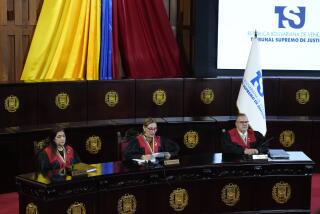Musharraf Sweeps Vote Amid Charges of Fraud
- Share via
ISLAMABAD, Pakistan — President Pervez Musharraf claimed a powerful mandate from Pakistani voters Wednesday while an independent human rights commission and opposition parties charged that a referendum on extending the army general’s rule was marred by massive fraud.
Nearly 98% of the ballots cast in Tuesday’s referendum supported Musharraf’s bid for five more years, said the country’s chief election commissioner, Irshad Hassan Khan.
But opposition parties, the human rights commission and newspapers reported that ballot-box stuffing and other abuses were widespread.
About 42.8 million Pakistanis voted in favor of extending the term of Musharraf, who was the only one on the ballot, while 883,676 voted no, the election commission said. Another 282,935 ballots were invalidated. Voter turnout was almost 70%, the commission said.
Even Information Minister Nisar Memon said he found the turnout surprising, since it has averaged only 40% in the last four elections between 1988 and 1997.
The many, serious irregularities mean that Musharraf’s claim to a mandate “is very tainted,” said Afrasaib Khattak, head of the human rights commission, in a telephone interview from Peshawar. “The turnout figure is grossly exaggerated. And the state machinery, the government institutions, have heavily intervened in favor of the president.”
Memon accused opposition parties of trying to discredit the referendum by coming up with what he called ridiculous numbers to support their claim that 90% of voters boycotted the referendum.
“The opposition has been summarily rejected, and now they should accept the verdict of the people,” he said.
Musharraf held the referendum, rather than run for election, in an effort to legitimize the power he seized in 1999. He is a crucial ally as U.S. forces step up covert operations against suspected Al Qaeda and Taliban fighters in unruly tribal areas along the Afghan border.
The human rights commission recently accused Musharraf of going back on his promise to crack down on extremists by quietly releasing thousands of people rounded up amid great publicity earlier this year.
Khattak said that Tuesday’s referendum has weakened rather than strengthened Musharraf’s legitimacy among Pakistanis.
“I think he has lost the benefit of the doubt, which some people were prepared to give him initially,” Khattak said.
The opposition, now a loose alliance of mainstream political parties, religious groups and nongovernmental organizations, called for Musharraf to resign, insisting that the turnout was no more than 10% of eligible voters.
Turnout estimates are at best a guess because there was no official voter list. The total electorate was estimated to be just under 62 million.
But Musharraf lowered the voting age from 21 to 18, and the last national census was in 1998, so the number of eligible voters is unknown.
Musharraf also declared the country a single constituency so people could vote anywhere they wanted. And he more than doubled the number of polling stations, which Khattak and other critics said opened the door to fraud.
Polling stations that served about 1,000 people had 3,000 ballots, Khattak alleged.
“We have examples of people who have voted twice or thrice,” said the human rights official. “And we have examples of stuffing ballot boxes by relevant authorities in stations where no one had voted at all.”
Reports from several parts of the country said government workers had been ordered to vote for Musharraf, and that they were transported to polling stations to ensure they did.
Memon, Musharraf’s information minister, dismissed the reports as fabrications.
“I think this is, again, in the domain of imagination, in the domain of opposition for the sake of opposition,” he told a news conference.
Khattak said his commission deployed monitors in all of Pakistan’s 150 districts, and they reported serious irregularities. Newspapers were filled with stories Wednesday such as that of a polling officer at a government-run teachers college who was spotted stamping ballot papers with “yes” votes.
The woman told reporters that the college principal had ordered her to complete 500 ballots even though only 150 people had voted.
Opposition parties and pro-democracy activists had asked the Supreme Court to declare Musharraf’s referendum unconstitutional, but the justices ruled Saturday that the vote could go ahead.
The court ruled that Musharraf was not violating the constitution because he had suspended it two days after the coup.
More to Read
Sign up for Essential California
The most important California stories and recommendations in your inbox every morning.
You may occasionally receive promotional content from the Los Angeles Times.













